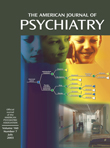Tourette’s-Like Syndrome and Dementia
To the Editor: Frontal-temporal dementia is associated with a variety of behavioral problems (1). We recently cared for a patient with frontal-temporal dementia who had developed an unusual problem: complex vocal and motor tic-like behavior reminiscent of Tourette’s syndrome.
Mr. A, a 79-year-old man with a 5-year history of frontal-temporal dementia, had developed disturbing tic-like behavior, consisting of slapping his forearm while grunting and swearing. This occurred many times per hour, generally without provocation, and was sufficiently disturbing that he and his wife were threatened with eviction by their landlord. He had been unable to tolerate a trial of haloperidol and had not responded to olanzapine or to quetiapine, the latter at 200 mg/day. Other behavioral problems included sexual disinhibition directed exclusively toward his wife and purposeless wandering. There was no evidence of mood disorder or psychosis.
Mr. A’s past medical and psychiatric history was unremarkable, and there was no prior history of tics. He had a remote history of moderate alcohol consumption. He was taking no medications. There was no family history of psychiatric or neurological illness. Upon a mental status examination, he exhibited a labile affect with clear witzelsucht. He was disoriented and amnestic, but his language was neurologically intact. He performed poorly on a test of controlled word fluency and showed paratonic rigidity bilaterally. A computerized tomography scan showed prominent frontal and anterior temporal atrophy. His sexual disinhibition was treated successfully with paroxetine, 40 mg/day, but this had no effect on his tic-like behavior. He was ultimately treated with clonidine, which was titrated without incident to 0.6 mg/day. This resulted in sustained, almost complete remission of the behavior over the past 5 months.
Tariot (2) espoused the concept of the therapeutic metaphor in the treatment of behavioral problems in dementia, whereby a behavioral syndrome reminiscent of a primary psychiatric illness tends to respond to typical treatment for that illness. Clonidine is known to be effective in the treatment of Tourette’s syndrome and proved to be remarkably effective for our patient.
Although changes in the frontal cortex and associated subcortical projections have been implicated in the pathophysiology of Tourette’s syndrome (3), a Tourette’s-like syndrome in dementia or neurological illness seems rare. Yochelson and David (4) reported a Tourette’s-like syndrome in a 16-year-old boy after resection of a left frontal arteriovenous malformation, and the syndrome was also responsive to clonidine. Oelenberg and Pach (5) reported a 52-year-old woman with frontal-temporal dementia who developed a Tourette’s-like syndrome that failed to respond to haloperidol or tiapride. Vigilance for a similar behavioral syndrome in individuals “with dementia” is warranted, since clonidine may be an effective treatment option.
1. Perry RJ, Miller BL: Behavior and treatment in frontotemporal dementia. Neurology 2001; 56(suppl 4):S46-S51Google Scholar
2. Tariot PN: Treatment strategies for agitation and psychosis in dementia. J Clin Psychiatry 1996; 57(suppl 14):21-29Google Scholar
3. Leckman JF: Tourette’s syndrome. Lancet 2002; 360:1577-1586Crossref, Medline, Google Scholar
4. Yochelson MR, David RG: New-onset tic disorder following acute hemorrhage of an arteriovenous malformation. J Child Neurol 2000; 15:769-771Crossref, Medline, Google Scholar
5. Oelenberg W, Pach J: [Tourette’s syndrome in progressive dementia] (German). Fortschr Neurol Psychiatr 1993; 61:35-37Crossref, Medline, Google Scholar



